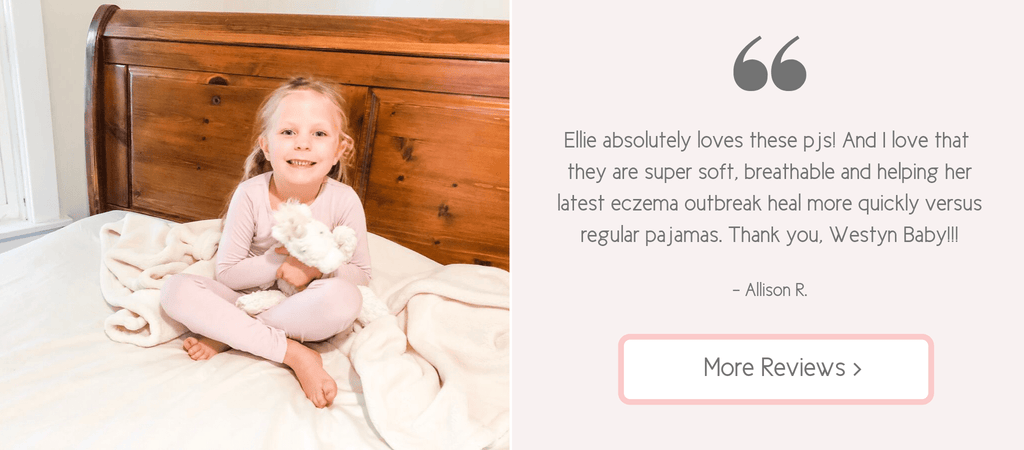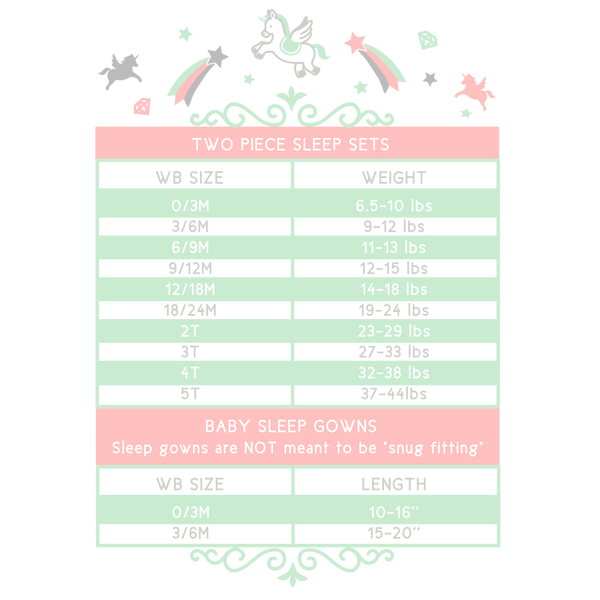Can Babies With Eczema Go Swimming?
For parents of little ones with eczema, the summer can be daunting. With more time spent outside comes more environmental irritants and potential flare ups. Then there’s sunscreen—what kind of sunscreen won’t irritate the skin?! Should it be mineral based? Must it contain calendula?! Not to mention it’s hot and since sweat is one of the most common eczema triggers—it contains trace elements of zinc, copper, iron, nickel, cadmium, lead, manganese, sodium and chloride and the build-up of these chemicals can irritate eczema—warm summer days can be tough on eczema-prone skin.
To avoid this nasty trigger, it’s tempting to cool down at the local pool, lake or (if you’re lucky) beach. For kids with healthy skin this is a no-brainer but for little ones with eczema, a dip in chlorine or salt water needs a little more consideration. So can babies with eczema go swimming? The short answer: YES! But if your baby or toddler suffers from eczema, there are some best practices and things to consider before your next trip to the pool, lake, or beach.
- Benefits of Swimming
- The Effects of Pool and Salt Water on The Skin
- Can Babies with Eczema Go Swimming?
- Swimming with Eczema: Best Practices
- Helpful Tips
- Summary
Benefits of Swimming
According to Jeffrey Bienstock, MD, managing partner at Pediatricare Associates in Fair Lawn, New Jersey, regulating body temperature is key to controlling eczema during the summer months: “We know that eczema is something we see all year-round...but in the summertime, it can be a little more challenging when the hot weather can make eczema itch more fiercely and the humidity makes it more difficult to control. So regulating the body temperature and ambient humidity is key.” What better way to do that than a little dip?!
In addition to being a very important skill to master, swimming is actually a reasonably skin-friendly form of exercise since it does not involve getting too hot and sweaty which is important for eczema sufferers. Moreover, swimming provides many long term and short term benefits for kids, including better sleep—which can be elusive for little ones with eczema— and stronger lungs (eczema babies have a higher risk of developing asthma). Swimming can also help aspects of baby’s growth and encourage positive developments such as confidence, balance and coordination.

The Effects of Pool and Salt Water on The Skin
So how about eczema and swimming pools for babies? Many environmental irritants can trigger an eczema flare up and swimming pool water is no exception. Chlorine is the most common disinfectant that is added into swimming pools and although it can be irritating to some people with eczema, many others find that it has a soothing effect. Since it’s a type of bleach, many eczema sufferers liken it to the soothing sensation of a diluted bleach bath, a common eczema remedy that many parents swear by! In fact, the concentration of chlorine in a bleach bath is roughly equivalent to the amount in a chlorinated swimming pool! That being said, it’s not uncommon for children with eczema to experience dry skin post-pool, especially if the pH of the water is raised and/or the pool water is too warm (we’ll dive more into that in a minute).
Just like chlorinated pool water, the effects of saltwater on eczema-prone skin vary greatly—it can be soothing for some and painful for others. According to Dr. Steven Q. Wang, director of Dermatologic Surgery and Dermatology at Memorial Sloan-Kettering Cancer Center in Basking Ridge, New Jersey, swimming in saltwater can actually be helpful for some people with eczema: “... the combination of salt plus ultra-violet (UV) light (as well as vitamin D) can be very beneficial. That’s why we use light UVB treatment in phototherapy (light therapy).” He notes, however, that salt pulls water out of skin faster, which is an important consideration for dry skin. Salt may also cause a burning sensation if the skin has been scratched or there is broken skin.
Can Babies with Eczema Go Swimming?
So can babies with eczema go swimming? Absolutely! Although baby eczema and swimming might make some parents nervous, swimming is an important skill that all children should learn—essentially the pros of swimming far outweigh the cons. Most of the time, little ones who have eczema can enjoy the pool or ocean, but according to the American Academy of Dermatology it’s best to avoid chlorinated pools when your child exhibits any of the following symptoms:
- Itchy, red, and oozing skin
- Skin infection
- Open sore or raw skin
- Severe eczema flare
Swimming With Eczema: Best Practices
Swimming is an important skill for your little one to learn, so instead of worrying too much about the effect of chlorine or salt on baby’s delicate skin, it’s better to focus on managing the skin before and after they take a dip. When taking your little one swimming, be sure to follow these best practices to manage the condition:

Moisturize Liberally. As always, moisturizer is eczema skin’s best friend. Since the chemicals in swimming pools and the salt of the beach can be drying, you should always apply a generous amount of moisturizer to your little one an hour before jumping in the water (seriously you can’t overdo it here!)—this will prevent the sunscreen from becoming diluted and ensure that it keeps its reflective properties that protect your baby’s skin.
Pre-swim, opt for moisturizers that are occlusives—those that work by forming a protective coating on the surface of your skin. Occlusives help keep the skin hydrated in two ways:
- Preventing water loss
- Keeping irritants, allergens, and other irritating particles away from the skin
If your little one has an irritated spots or unhealed scratches, an occlusive agent or barrier cream will also help protect them from itchiness that may result from external irritants. Mineral oil and petroleum are two of the most effective occlusive ingredients, but other effective occlusive agents include plant-based argan oil, jojoba oil, or safflower oil.
Use a Protective Wetsuit. A protective wetsuit in a necessity for sensitive skin in the summer! Protective suits—most of which now have a built in UPF protection (Ultraviolet Protection Factor)—will prevent your little one from scratching vulnerable areas during swim time while also protecting the skin from the drying effects of the sun. Plus, they help prevent any moisturizer from being rubbed off by the water. The protective layer of a wetsuit also protects the skin from any irritation that may be caused by swimming devices such as floaties or baby tubes.
Rinse Immediately. Once your little one gets out of the ocean or pool, immediately rinse the skin with fresh water (you might even want to pack a few bottles of fresh water to bring along). Pat the skin dry—don’t rub—leaving a little bit of moisture on the skin. Lather on some moisturizer and change baby into some dry clothes.
Bathe or Shower ASAP. Once you get home, a lukewarm (not hot) shower or bath is recommended. Use your usual eczema-friendly shower wash or gel to remove excess sunscreen and chlorine or salt. Within 3 minutes of shower or bath time, gently pat the skin dry with a towel and apply a generous amount of moisturizer to damp skin.
Helpful Tips
Research the Pool. Chlorine is one of the most common disinfectants added to swimming pools and in some cases it may cause irritation. If you’re concerned about your little one swimming with eczema, it’s a good idea to call the pool to gather information. Try to find out when the chlorine is added to the pool and avoid swimming immediately afterwards—the higher the chlorine level, the greater the risk of irritation. Ozone pools are much kinder to the skin, but unfortunately they’re also much less common.
Beware of Water Temp. Another thing to note is the pool’s water temperature. Baby pools are often warmer than adult pools, which is usually ideal for infants but not for eczema sufferers. Warmer water tends to be more drying while cooler water tends to be more soothing on irritated skin.
Use Eczema-Friendly Sunblock. Of course, sunblock is always a must and when dealing with sensitive skin. Ideally, opt for a mineral-based sunblock with SPF 50+. In a pinch, any sunblock is better than none, but at the very least try to avoid fragrances. Also keep in mind that eczema-prone skin tends to do better with sunscreens that contain zinc oxide or titanium dioxide, both of which sit on the skin rather than being absorbed.
To ensure proper protection, apply the cream in thick layers (the skin should remain a little white) and continue to reapply liberally and frequently. But don’t forget to lather on the moisturizer and let it settle for a bit before applying more sunscreen.
Keep It Short. Keep your first swim sesh short! Before diving into longer swim sessions with your little one, it’s advised that you first spend a short amount of time in the pool or ocean to determine how your child’s skin reacts to the water.
Summary
Sweat is one of the most common eczema triggers, so regulating body temperature is key to controlling eczema during the summer months. What better way to do that than taking your little one for a dip in the pool or ocean?
Swimming with eczema babies is not only safe, it’s recommended. Swimming is extremely beneficial for young children and it’s a vitally important life skill, so all babies should have experience swimming. The effects of both chlorinated pool water and saltwater on eczema-prone skin vary greatly—some people find chlorine or saltwater soothing while others do not. Rather than worrying about the effects of swimming on the skin, it’s better to focus on managing the condition by following every day best practices: moisturize liberally, use a protective wetsuit, rinse immediately, and bathe/shower ASAP. It may also be helpful to research the pool and beware of the pool temperature. Of course, use eczema-friendly sunscreen and keep swimming sessions short.
So can babies with eczema go swimming? YES! The chlorine in pool water or the salt of the ocean may cause some irritation, but certainly the pros of taking your little one swimming far outweigh the cons.
Please note: This article is informational only and is not intended to replace medical advice.


Sources
https://www.aad.org/public/diseases/eczema/eczema-resource-center/triggers/swimming-pool
file:///Users/Tara/Downloads/Eczema%20and%20swimming%20(Feb%2018).pdf
https://www.splashabout.com/blog/blog/protect-babys-eczema-irritation-swimming-pool/
https://www.scratchsleeves.co.uk/eczema-baby-swimming/
https://nationaleczema.org/swimming-eczema/
https://nationaleczema.org/earning-place-sun/
http://lesliebaumannmd.com/what-are-occlusives/
Leave a comment
Comments will be approved before showing up.












About The Author
Tara Saltzburg founded Westyn Baby when her son was an infant battling severe eczema. She was always on the lookout for products that would minimize the irritation and ease his discomfort, but safe, non-irritating pajamas proved difficult to find. Tara started Westyn Baby in 2016 with a mission to create better, safer sleepwear for kids - sleepwear that's exceptionally soft, flame-retardant free, sensitivity-friendly, and durable. Read more about WB sleepwear.
Tara was born and raised at the NJ shore and attended Penn State University, where she played soccer and discovered her love of mountain life. She is a mom of one boy and hopes to eventually have enough kids to form some sort of athletic team. She and her family currently reside in Central Pennsylvania and spend the summers in Stone Harbor, NJ.